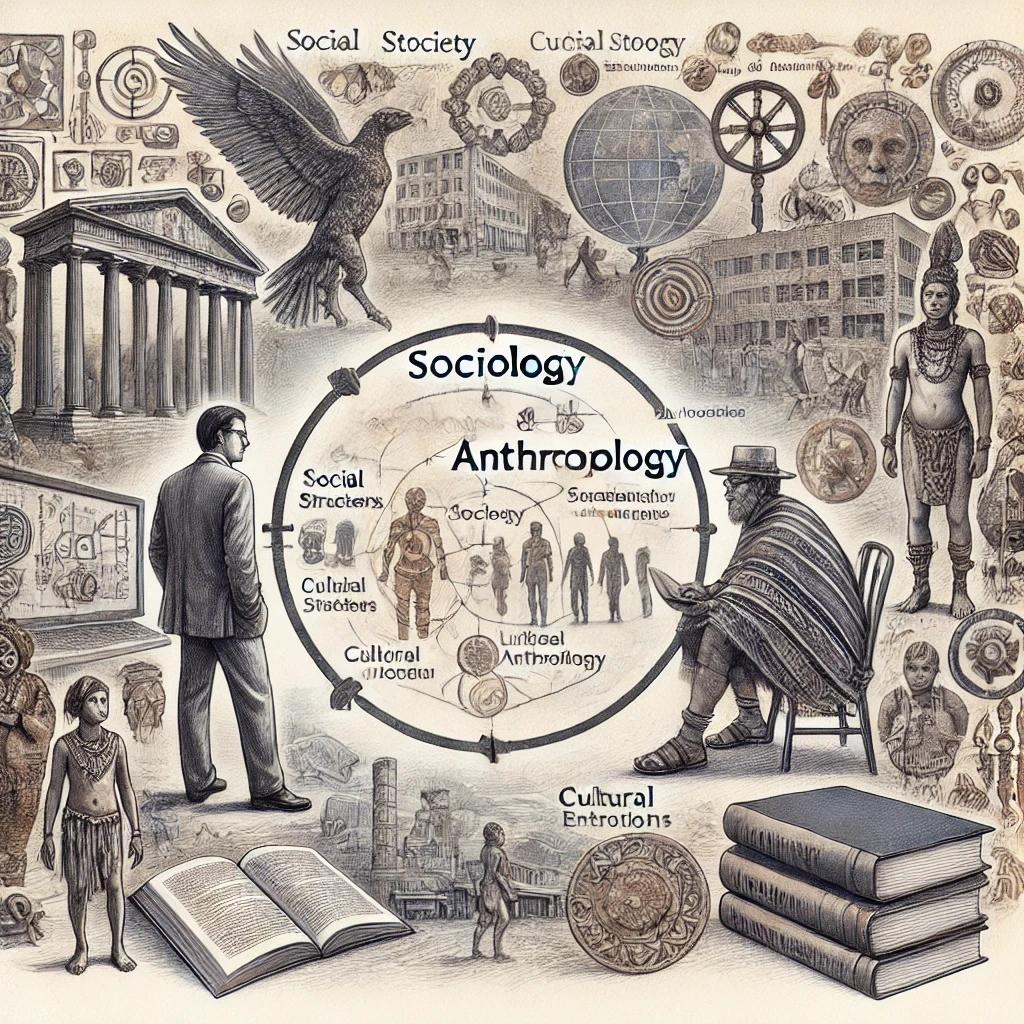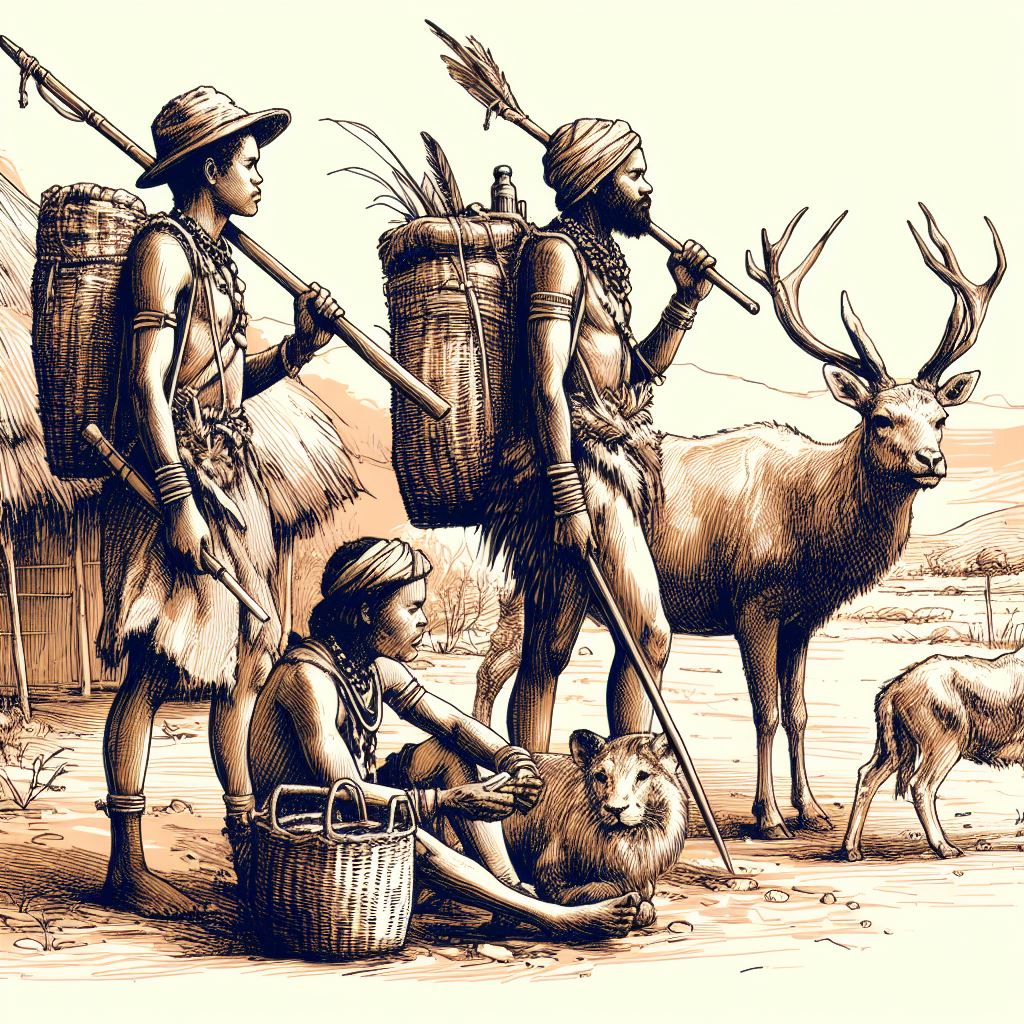The disciplines of Sociology and Anthropology have evolved alongside each other, converging and diverging in their perspectives on human societies and cultures. Both fields seek to understand social structures, cultural practices, and human interactions, but they employ distinct methods and focus areas. Here, we explore the similarities, differences, and points of convergence between Sociology and Anthropology, drawing on insights from influential thinkers to understand their relationship in contemporary social sciences.

The Origins and Development of Sociology and Anthropology
Sociology: Emergence and Scope
Sociology originated as a response to the social upheavals of the 19th century, particularly those spurred by the Industrial Revolution and the French Revolution. Auguste Comte, who coined the term “sociology” in 1838, envisioned it as a science of society aimed at identifying social laws. Comte argued that “social phenomena must be observed as systematically as natural phenomena,” emphasizing the application of scientific methods to understand social order and progress. Emile Durkheim, another pioneer, reinforced sociology’s scientific basis, asserting that “society is not merely a sum of individuals, but a system formed by their association.” Sociology thus focused on examining social institutions, norms, and changes in complex, industrial societies.
Anthropology: Roots and Range
Anthropology’s origins are even older, stretching back to 16th-century explorations that documented human diversity across cultures. While its foundations include cultural anthropology, physical anthropology, archaeology, and linguistics, social anthropology has the closest affinity to sociology. E.E. Evans-Pritchard, a prominent social anthropologist, described anthropology as “the study of man, embracing the entire social and cultural life,” highlighting its broad scope across humanity’s social structures and cultural expressions. Early anthropologists focused on small-scale societies, but as the field developed, their lens expanded to modern societies, merging insights with sociology.
Similarities between Sociology and Anthropology
The relationship between Sociology and Anthropology is marked by significant overlaps, particularly within social anthropology. Here are the primary areas of similarity:
Both fields are fundamentally concerned with social relationships and cultural contexts. They study family structures, social institutions, religion, and kinship, although from slightly different perspectives. As anthropologist Alfred Radcliffe-Brown remarked, “Social anthropology is a branch of sociology, the scientific study of social phenomena.” Radcliffe-Brown viewed anthropology as examining the fundamental social bonds that tie humans together, often mirroring the interests of sociology.
Methodological Convergence
Though their methodologies historically diverged, sociology and anthropology increasingly overlap in their research methods. While sociology traditionally relied on quantitative surveys and statistical analysis and anthropology on ethnographic methods, both disciplines now integrate these approaches. Sociologists use ethnographic methods to study community practices, while anthropologists may employ quantitative data to analyze social trends. Fred Voget noted this methodological convergence, observing that “both anthropology and sociology, following the model of science, combined description and generalization.”
Theoretical Overlap
Theoretical frameworks in sociology and anthropology frequently intersect. Both fields draw from structural-functionalism, symbolic interactionism, and conflict theory to explain social phenomena. Figures like Emile Durkheim have left a profound mark on both fields, particularly through his concept of the collective conscience. Durkheim believed that social cohesion is maintained by shared values, a theory that both sociologists and anthropologists employ in understanding group dynamics. As noted by Lucy Mair, “Social anthropology is sociology viewed through the comparative lens.”
Differences between Sociology and Anthropology
Despite their overlaps, sociology and anthropology maintain distinct differences in focus, origins, and methods.
Scope and Scale
Sociology and anthropology have traditionally differed in scope and scale. Sociology examines industrialized societies and larger social structures, studying broader social issues such as class and bureaucracy. Anthropology, on the other hand, originally focused on smaller-scale, often non-industrial societies, exploring their unique cultural practices. This distinction is summed up by E.E. Evans-Pritchard’s assertion that “sociology deals with the aspects of complex societies, while anthropology studies simpler ones.” Although both fields have evolved beyond these distinctions, the contrast between macro and micro perspectives remains a point of divergence.
Origins and Intellectual Foundations
Sociology and anthropology differ in intellectual heritage. Sociology, emerging from European philosophy, sought to understand the social order and social change, influenced by thinkers like Comte and Karl Marx. Anthropology’s development was more interdisciplinary, combining insights from natural sciences, history, and archaeology. Marvin Harris famously remarked, “Anthropology began as the science of history,” reflecting its origins in documenting human cultures. While sociology has a philosophical basis, anthropology’s roots in natural science contributed to its early focus on cultural evolution and human adaptation.
Methodological Distinctions
Methodology represents a defining difference. Sociologists traditionally collect data through surveys, interviews, and statistical analysis, aiming for broader societal generalizations. Anthropologists typically employ ethnographic fieldwork—living within the societies they study to deeply understand their culture and social norms. This distinction in methodology was observed by early anthropologist Bronislaw Malinowski, who insisted that “anthropologists must learn the language, habits, and worldview of the people they study,” emphasizing immersive observation over detached analysis.
Table highlighting the differences between Sociology and Anthropology:
| Aspect | Sociology | Anthropology |
|---|---|---|
| Scope and Focus | Primarily focuses on modern, industrialized societies and large social institutions. | Traditionally focuses on small-scale, non-industrialized societies and holistic culture study. |
| Methodology | Frequently uses quantitative methods (surveys, statistical analysis) to analyze trends. | Emphasizes qualitative methods, especially participant observation and ethnography. |
| Historical Development | Emerged in the 19th century to study social change in Europe; influenced by philosophy. | Has origins in 16th-century exploration; initially categorized as a natural science. |
| Primary Concepts | Examines social structures, institutions, class, and norms in contemporary settings. | Focuses on culture, kinship, rituals, and traditions in diverse societies. |
| Perspective | Often takes a macro-level approach, examining societal systems and urban environments. | Traditionally takes a micro-level approach, studying specific communities in-depth. |
Convergences between Sociology and Anthropology
Blurred Disciplinary Boundaries
As both fields expand their scope, the boundaries between sociology and anthropology have blurred. Anthropologists now frequently study urban and industrial societies, while sociologists apply their theories to small communities. This convergence has given rise to interdisciplinary areas like ethnosociology and social anthropology, which apply sociological theories to anthropological studies of social structures. This cross-fertilization enriches both fields, as each benefits from the other’s insights and methods.
Influence in Applied Social Sciences
The practical applications of sociology and anthropology have also overlapped significantly, with both fields contributing to public health, education, and social policy. Sociologists and anthropologists work together in development projects and public policy, applying their knowledge to improve societal conditions. As Radcliffe-Brown put it, “The function of anthropology is not merely to describe, but to understand the principles of social organization.”
Mutual Influence in Developing Nations
In developing countries, particularly in India, the distinction between sociology and anthropology has been even less pronounced. Indian sociologists and anthropologists study overlapping topics, from rural to urban settings, often within the same departments. The Indian Council of Social Science Research (ICSSR) acknowledges this by grouping sociology and social anthropology under one research unit. Andre Beteille, a prominent Indian sociologist, highlighted this convergence, noting that “When an Indian studies a tribal village, he is an anthropologist; when he studies a city, he is a sociologist.” This blending reflects the fluidity of the disciplines, especially in regions where societal dynamics transcend strict academic categories.
Conclusion
The relationship between Sociology and Anthropology reveals both distinctions and deep interconnectedness. Sociology’s broader focus on industrial societies and social institutions contrasts with anthropology’s holistic, immersive study of human cultures. However, these fields share a foundation in understanding human relationships, social structures, and cultural practices. As E.A. Hoebel eloquently observed, “Both sociology and anthropology study the relations of men to men,” underscoring their shared commitment to exploring the human experience.
While differences persist in methodologies and focus, Sociology vs. Anthropology has become a less rigid distinction. Their convergence in addressing global issues—such as urbanization, migration, and identity—demonstrates the complementary strengths of both fields in contemporary social science. For students, scholars, and practitioners, recognizing both the distinctions and intersections between these disciplines enriches our understanding of humanity, enhancing our ability to address the complexities of a rapidly changing world.
References
- Beattie, J. (1964). Other cultures: Aims, methods, and achievements in social anthropology. London: Routledge & Kegan Paul.
- Beteille, A. (1974). “Sociology and ethnosociology.” International Social Science Journal, 26(4), 692-707.
- Evans-Pritchard, E. E. (1951). Social anthropology. London: Cohen & West.
- Hoebel, E. A. (1958). Man in the primitive world: An introduction to anthropology. New York: McGraw-Hill.
- Kuper, A. (1983). Anthropologists and anthropology: The British school, 1922-1972. London: Routledge.
- Mair, L. (1965). An introduction to social anthropology. Oxford: Oxford University Press.
- Voget, F. W. (1975). A history of ethnology. New York: Holt, Rinehart and Winston.


